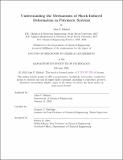Understanding the Mechanisms of Shock-Induced Deformation in Polymeric Systems
Author(s)
Mikhail, John P.
DownloadThesis PDF (24.44Mb)
Advisor
Rutledge, Gregory C.
Terms of use
Metadata
Show full item recordAbstract
Shock waves, commonly resulting from ballistic or explosive impact in military scenarios, are highly destructive and pose significant health risks due to their rapid, intense energy transfer. To mitigate these effects, it is crucial to design armor capable of absorbing and dissipating shock wave energy, thus safeguarding the wearer. Traditional materials like woods and metals often fall short in meeting these requirements due to their low toughness, high weight, limited flexibility, or manufacturing challenges. Furthermore, even when suitable materials are identified, they often have unclear physical deformation mechanisms contributing to their dissipative properties; thus, it is difficult to generalize the benefits of one material in order to find alternatives.
This thesis focuses on the study of polymeric materials, which often outperform traditional materials in terms of shock energy absorption. The vast design space of polymers affords them a diverse set of physical properties and adaptability to different applications. Researchers can tailor these properties by altering the polymers' type, composition, or structure. In order to obtain detailed mechanistic understanding of the shock response of some polymeric materials, atomic and molecular scale simulations are leveraged and the configurational and vibrational responses of the systems analyzed. The thesis work consists of three major projects: (1) a theoretical study of the statistics of Gaussian polymer chains under harmonic applied fields, (2) a computational study of semicrystalline and crystalline models of polyethylene (PE) undergoing shock deformation, and (3) a computational study of liquid ethanol systems undergoing shock deformation.
The theoretical study of Gaussian chains generalizes previous literature models and is shown to well approximate a variety of applications involving polymer confinement. A wave equation is derived from the force-compression relationship of the Gaussian chains--with the addition of a viscous damping fluid--and is connected to the well-studied Korteweg de Vries equation. The effects of material properties (dispersion, dissipation, and nonlinear elasticity) on the propagation of a shock wave are demonstrated explicitly.
The computational study of semicrystalline PE considers systems of three different crystallinity fractions; their configurational changes under shock are analyzed, distinguishing the responses of the crystalline and noncrystalline regions of the systems. Physical mechanisms underlying the deformation response of these materials, including crystallographic slip and loss of nematic order, are identified as a function of shock pressure. The prominence of these mechanisms is shown to be a non-monotonic function of lamellar thickness and crystallinity fraction, and they each contribute to shock energy storage.
The computational study of ethanol reveals the configurational and vibrational changes undergone by the liquid in response to elevated shock pressure and temperature. Shifts of vibrational peaks are observed and compared with experimental results from our collaborators. The hydrogen bonding network responds to energy from the shock wave, resulting in structural and dynamical alterations which may have implications for thermal conductivity and reduction of hot spot formation from shocks.
Overall, this thesis presents a multipronged and detailed approach to understanding shock deformation in polymeric and organic systems, offering mechanistic insights and methodological frameworks applicable to a broader range of materials.
Date issued
2024-02Department
Massachusetts Institute of Technology. Department of Chemical EngineeringPublisher
Massachusetts Institute of Technology